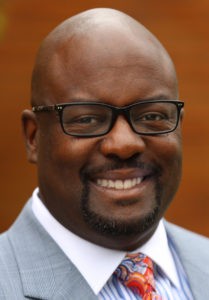“Trauma” is a word that comes from the Greek term for “wound.” Often, the most painful wounds are not physical, but those that cannot be seen with the natural eye. There is a particular type of trauma that can impact a person comprehensively. I’m referring to racial trauma.
According to psychiatrist Robert Carter, racial trauma or race-based traumatic stress is created by the cumulative effects of racism on an individual’s mental and physical health. Racial trauma directly impacts Black and indigenous people and other people of color, as they are the targets of systemic racism. In fact, the American Medical Association has acknowledged that “racism is a public health issue.”
God has called Christians to be the healing hands of Jesus in the world. Therefore, local congregations must be prepared to minister to those impacted by racial trauma.

Joel Bowman Sr.
I have the privilege of being bivocational, serving both as a pastor and a mental health clinician. As an African American male, I have experienced racial trauma throughout my life, so this is intensely personal to me.
To be sure, racial trauma is a wound to the soul. This is the case because the sins of interpersonal and institutional racism are an affront to the Imago Dei (Latin for “image of God”). Genesis 1:27 says, “So God created man in his own image.” All image-bearers, regardless of race or ethnicity, have inherent worth and dignity and should be treated as equals. However, we live in a racialized society in which whites are at the top of the racial hierarchy, and Blacks are at the bottom. This can be readily seen in the areas of immigration, education, economics, housing, policing, criminal justice, health care, and yes, religion.
Historically, white-run churches and denominations have been complicit in traumatizing African Americans and other people of color. So, how can white-majority and multi-ethnic churches play a part in healing traumatic wounds? I believe this must involve six key areas.
Personal awareness
White-majority and multiethnic churches must be intentional about raising members’ awareness of the true history of racism and its continuing impact on persons of color. This can be done through teaching or statements by leaders. Author Jemar Tisby has said, “You can’t heal what you don’t reveal.”
In most white evangelical churches, the names George Floyd, Breonna Taylor, Ahmaud Arbery, Alton Sterling, Sandra Bland, Tamir Rice, Michael Brown, Eric Garner, Trayvon Martin and Emmett Till never have been mentioned from the pulpit as examples of those who were killed because of racism. Consequently, non-white worshipers in these churches often feel devalued and ignored. By never hearing the aforementioned names, white members are allowed to remain ignorant of or callous to the racist conditions that are endemic to our society. As members’ awareness of racism is heightened, they can then be challenged to “do justice” in their communities.
“White-majority and multiethnic churches must be intentional about raising members’ awareness of the true history of racism and its continuing impact on persons of color.”
Public lamentation and confession
Lamentation is an often-neglected aspect of worship. To lament is to express grief or sorrow. Romans 12:15 says, “Rejoice with those who rejoice; weep with those who weep.”
The psalmists and the Old Testament prophets engaged in lamentation. Churches can help worshipers heal from racial trauma through public lamentation. This can take the form of prayers, songs, testimonies, liturgical dance and responsive readings, all of which can be cathartic. It was a poignant moment of lamentation when President Barack Obama led in the singing of “Amazing Grace” after the massacre of nine worshippers at the Mother Emanuel Church.
Churches should corporately confess and repent of the sin of racism wherever and whenever it has existed in their ranks. Spiritual leaders have a responsibility to publicly confess past sins of a faith community, even if they were not personally engaged in them. In Scripture, we see how Ezra did this on behalf of the Jewish people, after the temple had been rebuilt. He took personal responsibility for those he represented.
Prophetic preaching
When confronting the sin of racism, preachers can fill a pivotal role. Jesus boldly spoke truth to power, challenging unjust religious structures. He made it clear in his preaching and dialogue with others that justice is a kingdom priority.
In Matthew 23:23, Jesus said, “Woe to you, scribes and Pharisees, hypocrites! You pay a tenth of mint, dill and cumin, and yet you have neglected the more important matters of the law — justice, mercy and faithfulness.”
“Preaching about racism must be done with specificity.”
Preaching about racism must be done with specificity. Some only preach generically about racism. Even then, the focus is only on an individual’s racist act, rather than the larger systemic forces that have contributed to countless racist acts.
In his “Letter from Birmingham Jail,” Martin Luther King Jr. said, “I have watched white churchmen stand on the sideline and mouth pious irrelevancies and sanctimonious trivialities.” Sadly, many preachers communicate like the churchmen King referenced in his letter.
Pastoral care and referral
In the Bible, the work of a pastor is likened to that of a shepherd. Good shepherds care for the sheep whom they lead. For instance, given the recent rise in anti-Asian racism, it would be wise for pastors or elders to check up on Asian American and Pacific Islander families in their congregations. Undoubtedly, many families have experienced racial trauma and need to be supported and reassured that their church is a safe place.
In my practice as a therapist, I have encountered non-white clients who have been racially traumatized to the extent that they meet the diagnostic criteria of Post-Traumatic Stress Disorder. Such persons could benefit greatly by professional intervention that most churches are not equipped to provide. In that case, it is important that churches have a list of clinical resources, so that appropriate referrals can be made. Church leaders must admit their limitations in this regard.
Peaceful protest
The concept of justice did not originate with some “liberal” or “progressive” ideologue. Rather, it originated with the God of justice. Inasmuch as God is perfectly just, the people of God must advocate for racial justice where it is lacking.
“The concept of justice did not originate with some ‘liberal’ or ‘progressive’ ideologue. Rather, it originated with the God of justice.”
Some believe that protests are inherently sinful. However, Scripture tells us that we are to call out oppressive systems that exploit the vulnerable. Proverbs 31:8-9 says: “Speak up for those who cannot speak for themselves, for the rights of all who are destitute. Speak up and judge fairly; defend the rights of the poor and needy.” Peaceful protest is a practical way in which churches can apply this verse. Even if a church cannot find like-minded entities with which to partner, it can organize its own racial justice protests.
Progress, not perfection
Finally, churches must realize they will not be perfect in their efforts to heal the wounds of racial trauma. But clearly, pushing for progress is far better than doing nothing.
Moreover, not all efforts, however well-intentioned they might be, will be happily received by those people churches endeavor to serve.
It should be noted that humility and empathy are two offspring of biblical love. When church leaders and members are truly humble, they will center those who have been racially traumatized, submitting to their guidance in terms of how best to support them.
Empathy involves sitting with people, without judgment, connecting emotionally with them. Empathy is beautifully illustrated by the Zulu (or South African) greeting, sawubona, which literally means “We see you.”
Today, racially oppressed people need the church to see them. May we see them through the eyes of Jesus.
Joel A. Bowman Sr. is a native of Detroit and serves as the founder and senior pastor of Temple of Faith Baptist Church, in Louisville, Ky. He also maintains a practice as a licensed clinical social worker with nearly 30 years of experience in the mental health field. His commentaries and poems have been printed in numerous publications. Joel and his wife, Nannette, have three children, Kayla, Katie and Joel Jr. Follow him on Twitter @JoelABowmanSr.
Related articles:
Finding new life in the desert as a church becomes a place of healing for racial trauma | Opinion by Nataly Mora
Four R’s for racial reckoning by the white church | Opinion by Mel Williams


